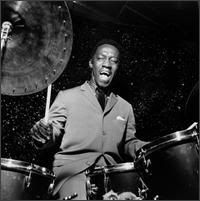
Art "Bu" Blakey from Night Lights
Art Blakey was born at 28 Chauncey Street in the Hill District in 1919. He received some piano lessons at school and by the seventh grade was playing music full-time and had his own band. Shortly afterwards he switched to drums and taught himself how to play in the thumping swing style of Chick Webb and Sid Catlett. In other words, he pounded on those kits.
Along with Kenny Clarke (also a 'Burgher) and Max Roach, he became one of the founding fathers of modern drumming. His trademark on the skins was the clash of the hi-hat on every second and fourth beat. Instead of keeping beat with the bass drum, he freed it to become part of the rhythm. Blakey popularized the driving hard-bop style used by many of today's drummers.
By the 1940s, Blakey was a member of jazz bands led by Mary Lou Williams, Fletcher Henderson, and Billy Eckstine. Williams and Eckstine were from East Liberty. Nothin' like keeping it in the 'hood, hey?
Blakey was also a session man for players like Miles Davis, Bud Powell and Thelonious Monk by the late forties and early fifties. He played on Monk's first recording session for Blue Note Records (in 1947), his last one (in 1971), and a whole lot of them in between.
Blakey said of his mentor: "He [Monk] was responsible for me when I moved from Pittsburgh to New York. He used to take me and Bud Powell around to all the clubs to play. If the musicians didn't want us to sit in, he'd run them off the stage, sit down, and play with me. At that time jobs were so few, and musicians had cliques. Times were tight, things were changing, but Monk was just outstanding in himself. He's a great person."
He converted to Islam during a visit to West Africa in the late 1940s and took the name Abdullah Ibn Buhaina (which earned him the nickname "Bu".) The African visit is often debated as he was never gone from America long enough for the year-long journey he said he made. Some suspect the trip never took place except in his mind. It's a tempest in a teapot if you ask me. You don't have to physically return to your roots to actually find your roots, right?
Then he started one of the seminal bands of bop, The Jazz Messengers. For more than 30 years his group featured young musicians who went on to become huge names in jazz. The band's legacy is more than just the great music it produced. It's also remembered for being a proving ground for several generations of jazz musicians. Blakey and Miles Davis were famous for giving the young guns a place to learn their licks.
Over the years the Jazz Messengers served as a springboard for young jazz lions such as Donald Byrd, Johnny Griffin, Benny Golson, Lee Morgan, Wayne Shorter, Freddie Hubbard, Chuck Mangione, Woody Shaw, Cedar Walton, and Joanne Brackeen.
Blakey went on to record dozens of albums with a constantly shifting group of Jazz Messengers. He always stood behind his kids, whichever ones they happened to be at the time. Blakey said "I'm gonna stay with the youngsters. When these get too old I'll get some younger ones. Keeps the mind active."
Up to the 1960s Blakey also recorded as a sideman with many other musicians: Jimmy Smith, Herbie Nichols, Cannonball Adderley, Miles Davis, Grant Green, and Jazz Messenger alumni Lee Morgan and Hank Mobley, among others. From the mid-1960s on, he mostly concentrated on the band.
After barely weathering the fusion era in the 1970s, Blakey's band got a shot in the arm in the early 1980s with the return of more traditional jazz. Wynton Marsalis was the band's trumpeter and musical director during that period.
Blakey continued performing and touring with the group into the late 1980s. He died in 1990 in New York City, leaving behind a legacy that's still the model for countless hard-bop players.
He piled up a mountain of honors: Newport Jazz Festival Hall of Fame, Downbeat Jazz Hall of Fame, Reader's Choice Award, Smithsonian Performing Arts Certificate of Appreciation, Jazz Hall of Fame, Grammy Award Best Jazz Instrumental Performance for the album "New York Scene," Jazznote Award, Doctorate of Music from Berklee College of Music, Martin Luther King Humanitarian Award, Grammy Hall of Fame Induction for the album "Moanin'," Pittsburgh Jazz Festival Award, Grammy Lifetime Achievement Award (awarded posthumously) and had the Blakey Program Center in Wylie Avenue's Hill House named for him.
Not to mention a discography of pile drivin' music and a generation of jazz players that he raised. Blakey took good care of his drumming and of his young lions, too. He'll be long remembered for both.
Art Blakey and The Jazz Messengers - A Night In Tunisia
No comments:
Post a Comment